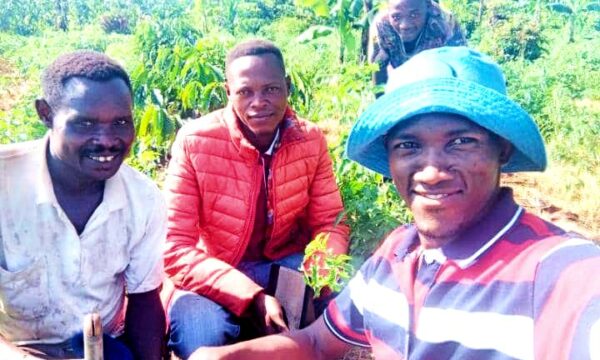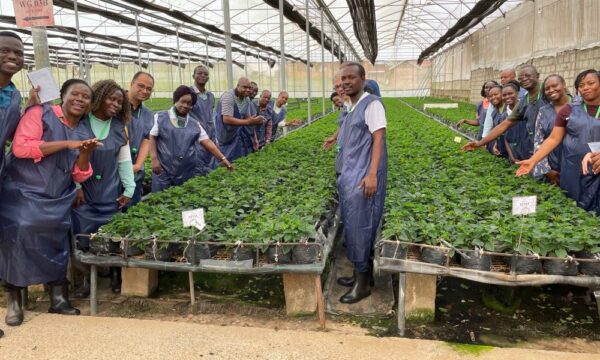
Breaking down the barriers to international trade has never been more important. Flowers are a profitable form of income for many low- and middle-income countries. However, small-scale growers in places like Uganda face hurdles accessing the kind of information and technologies needed to improve the standard of produce to supply lucrative global markets like the European Union (EU).
The floriculture industry in Uganda shows significant trade potential. On average, the Uganda flower industry achieves exports of about US$30 million per year and aims to increase this figure to US$50 million by 2021. Besides being a leading export earner for Uganda, the floriculture sector supports the livelihoods of over 40,000 individuals.
Although relatively new, the industry is important. In 2018, it directly employed about 8,700 people, most (70%) of whom were vulnerable women aged between 20 and 40 years of age. The sector has huge potential to contribute to the country’s national economy, generate employment, stimulate infrastructural growth and improve livelihoods.[1]
Increasing value chain efficiency and helping growers in the floriculture sector to meet Sanitary and Phytosanitary (SPS) standards is essential. It means they can protect their produce from contaminants such as diseases and pests and export to international markets.
Floriculture project in Uganda
From October 2012 to March 2015, Uganda was funded by the Standards and Trade Development Facility (STDF) to run a project strengthening the country’s ability to control plant diseases in its floriculture industry. The goal was to reduce the presence of harmful organisms such as the African cotton leafworm (Spodoptera littoralis) – a species of moth found widely in Africa – in order to improve the standard of Uganda’s rose exports and increase its trade to the EU.
The project was led by Uganda’s Department of Crop Protection, which was then playing the role of National Plant Protection Organization in the Ministry of Agriculture Animal Industry and Fisheries, in partnership with the Uganda Flower Exporters Association. CABI managed the project.

Project partners worked to develop the ability of Uganda’s Department of Crop Protection to implement phytosanitary inspections and certification of flower export consignments in line with international standards and EU market requirements. They also worked to streamline the inspection and export certification system by building cooperation mechanisms between the Department of Crop Protection and the flower sector.
The project focused on creating an operational phytosanitary survey and monitoring system by building the ability of the Department of Crop Protection to undertake specific surveys to collect data and generate information on pests of concern such as S. littoralis. It also worked to improve awareness among national decision makers and stakeholders of the importance of a well-functioning plant health system including inspection and certification systems.
Study reveals the project’s impact
At the end of the project, an evaluation found that the work had enhanced the ability of Uganda’s Department of Crop Protection to do all of these things. It had put in place systems for collaboration between the public and private sectors to such a level that phytosanitary inspections and certification of flower consignments were in line with the EU’s requirements.
Four years after the project ended, CABI and Uganda’s Department of Crop Inspection and Certification undertook a post-project evaluation to assess impacts made by the project. The study found that the number of interceptions due to the leafworm on rose flower exports had drastically reduced (from 36 in 2013 to zero in 2018) during and after the project and this was directly attributed to the continued outcomes from the project’s interventions. Knowledge imparted to staff in the flower farms on how to manage and eliminate the pest in production sites continued to be applied, leading to a near total elimination of the pest.
Collaboration and funding mechanisms agreed upon between the farms and the Department of Crop Protection are now fostered through the Uganda Flower Exporters Association resulting in prompt action on pest notifications from the EU. Disincentives for non-compliance to agreed pest management measures have been very effective in encouraging adherence among the farm owners.
The rise of a new pest
Despite the leafworm being well managed, Uganda’s flower and horticultural exports to the EU remain under threat because of rising interceptions due to the presence of a new pest – the false codling moth(Thaumatotibia leucotreta), which was declared a regulated pest in the EU in 2018.
Although the leafworm pest is no longer a key concern, increasing interceptions due to the false codling moth point to the need for the country to put in place a robust integrated systems’ approach to pest management, inspection and certification so that the country is ready to tackle existing as well as emerging pests in future.
Such efforts are already being actively considered through a multisectoral approach supported by a presidential initiative that is addressing both the horticulture and the floriculture sectors.
As a result of the success with the floriculture project, Uganda applied for and succeeded in securing a new project funded by the STDF and the Netherlands government to support the horticulture sector, particularly the fresh fruits and vegetable export sector to address interceptions due to a number of pests, key among them the false codling moth.
Additional information
Main image: Floriculture in Ugandan greenhouse. Photo taken pre-COVID (Credit: CABI).
Author:
Florence Chege, Project Scientist, CABI
To read the working paper in full, see Assessing the Impact of Strengthening Phytosanitary Capacity of the Floriculture Sector in Uganda
To learn more about CABI’s work in value chains and trade, click here.
[1] See page 6 of Assessing the Impact of Strengthening Phytosanitary Capacity of the Floriculture Sector in Uganda
Related News & Blogs
Strengthening the potato value chain in the Kurdistan Region of Iraq
On 30th May, we marked the International Day of Potato. In this blog, CABI’s Crop Health Advisor Anna Wood provides an update on a five-year project led by CABI to strengthen the potato value chain in the Kurdistan Region of Iraq. An ambitious five-yea…
3 June 2025




